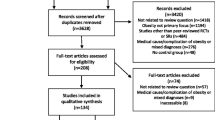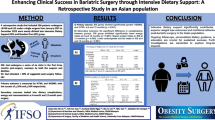Abstract
Background
Significant, sustained weight loss through conventional, non-surgical interventions is often unattainable for people with severe obesity (e.g. BMI ≥40 or ≥35 kg/m2 with co-morbidities). Bariatric surgery is effective in treating severe obesity, but surgery alone without additional behaviour change management may not result in optimum long-term weight loss and maintenance. This systematic review and meta-analysis of randomised controlled trials evaluated the effectiveness of lifestyle interventions before and/or after bariatric surgery.
Methods
MEDLINE, Embase, Cochrane Central Register of Controlled Trials and clinical trials registers were searched for eligible studies. Key journals were handsearched. Last search date was on December 2014. Eligible interventions had the explicit aim of changing behaviour related to diet and/or physical activity, starting within 12 months of surgery, either pre- or post-operatively, and with at least 6 months’ follow-up. The primary outcome was weight change; secondary outcomes included surgical complications, quality of life and changes in co-morbidities. Random effect meta-analyses were undertaken. Study quality was assessed with the Cochrane Collaboration’s risk of bias tool.
Results
Eleven trials met the inclusion criteria. Behavioural interventions appear to improve weight loss at 12 months after bariatric surgery. Secondary outcome data were lacking and weight outcomes were reported inconsistently. Overall, the methodological quality of the identified trials was low.
Conclusions
The strength of evidence is limited by the relatively small number of trials identified and by their low methodological quality and short follow-up duration. Well-designed randomised controlled trials (RCTs) with long-term follow-up are required.









Similar content being viewed by others
References
Colquitt JL, Picot J, Loveman E, et al. Surgery for obesity. Cochrane Database of Syst Rev. 2009; Issue 2:CD003641. doi:10.1002/14651858.CD003641.pub3
Picot J, Jones J, Colquitt JL, et al. The clinical effectiveness and cost-effectiveness of bariatric (weight loss) surgery for obesity: a systematic review and economic evaluation. Health Technol Assess. 2009;13(41):1–190.
Gloy VL, Briel M, Bhatt DL, et al. Bariatric surgery versus non-surgical treatment for obesity: a systematic review and meta-analysis of randomised controlled trials. BMJ. 2013;347:f5934.
Courcoulas AP, Christian NJ, Belle SH, et al. Weight change and health outcomes at 3 years after bariatric surgery among individuals with severe obesity. J Am Med Assoc. 2013;310(22):2416–25.
Adams TD, Davidson LE, Litwin SE, et al. Health benefits of gastric bypass surgery after 6 years. JAMA. 2012;308(11):1122–31.
Sjostrom L, Lindroos AK, Peltonen M, et al. Lifestyle, diabetes, and cardiovascular risk factors 10 years after bariatric surgery. N Engl J Med. 2004;351(26):2683–93.
Sjöström L, Peltonen M, Jacobson P, et al. Association of bariatric surgery with long-term remission of type 2 diabetes and with microvascular and macrovascular complications. JAMA - J Am Med Assoc. 2014;311(22):2297–304.
Sarwer DB, Dilks RJ, West-Smith L. Dietary intake and eating behavior after bariatric surgery: threats to weight loss maintenance and strategies for success. Surg Obes Relat Dis. 2011;7(5):644–51.
CG189: Obesity: identification, assessment and management of overweight and obesity in children, young people and adults [document on the Internet]. London: National Institute for Health and Care Excellence; 2014. Available from: http://www.nice.org.uk/guidance/cg189. [Accessed November 2014]
Guideline 115: Management of obesity [document on the Internet]. Edinburgh: Scottish Intercollegiate Guidelines Network; 2010. Available from: http://www.sign.ac.uk/pdf/sign115.pdf. [Accessed August 2013]
National Health Medical Research Council. Clinical practice guidelines for the management of overweight and obesity in adults, adolescents and children in Australia [document on the Internet]. Melbourne: Australian Government Department of Health; 2013. Available from: https://www.nhmrc.gov.au/guidelines/publications/n57. [Accessed February 2015]
Expert panel report. Guidelines (2013) for the management of overweight and obesity in adults. Obesity. 2014;22(Suppl2):S41–410.
Mechanick JI, Youdim A, Jones DB, et al. Clinical practice guidelines for the perioperative nutritional, metabolic, and nonsurgical support of the bariatric surgery patient-2013 update: cosponsored by American Association of Clinical Endocrinologists, the Obesity Society, and American Society for Metabolic & Bariatric Surgery. Obesity. 2013;21(Suppl1):S1–27.
Livhits M, Mercado C, Yermilov I, et al. Does weight loss immediately before bariatric surgery improve outcomes: a systematic review. Surg Obes Relat Dis. 2009;5(6):713–21.
Livhits M, Mercado C, Yermilov I, et al. Is social support associated with greater weight loss after bariatric surgery?: a systematic review. Obes Rev. 2011;12(2):142–8.
Rudolph A, Hilbert A. Post-operative behavioural management in bariatric surgery: a systematic review and meta-analysis of randomized controlled trials. Obes Rev. 2013;14(4):292–302.
Beck NN, Johannsen M, Stoving RK, et al. Do postoperative psychotherapeutic interventions and support groups influence weight loss following bariatric surgery? A systematic review and meta-analysis of randomized and nonrandomized trials. Obes Surg. 2012;22(11):1790–7.
Higgins JPT, Green S. Cochrane Handbook for Systematic Reviews of Interventions version 5.0.2. 2011. Available from: http://www.cochrane-handbook.org/. [Accessed May 2014]
Higgins JPT, Thompson SG, Deeks JJ, et al. Measuring inconsistency in meta-analyses. BMJ. 2003;327(7414):557–60.
Dodsworth A, Warren-Forward H, Baines S. Feasibility of a protein-enriched diet after laparoscopic adjustable gastric banding: results from a pilot intervention. e-SPEN J. 2012;7(2):e57–63.
Lier HO, Biringer E, Stubhaug B, et al. The impact of preoperative counseling on postoperative treatment adherence in bariatric surgery patients: a randomized controlled trial. Patient Educ Couns. 2012;87(3):336–42.
Nijamkin MP, Campa A, Sosa J, et al. Comprehensive nutrition and lifestyle education improves weight loss and physical activity in Hispanic Americans following gastric bypass surgery: a randomized controlled trial. J Acad Nutr Diet. 2012;112(3):382–90.
Ogden J, Hollywood A, Pring C. The impact of psychological support on weight loss post weight loss surgery: a randomised control trial. Obes Surg. 2014. doi:10.1007/s11695-014-1428-2.
Papalazarou A, Yannakoulia M, Kavouras SA, et al. Lifestyle intervention favorably affects weight loss and maintenance following obesity surgery. Obesity. 2010;18:1348–53.
Parikh M, Dasari M, McMacken M, et al. Does a preoperative medically supervised weight loss program improve bariatric surgery outcomes? A pilot randomized study. Surg Endosc. 2012;26(3):853–61.
Sarwer DB, Moore RH, Spitzer JC, et al. A pilot study investigating the efficacy of postoperative dietary counseling to improve outcomes after bariatric surgery. Surg Obes Relat Dis. 2012;8(5):561–8.
Swenson BR, Saalwachter SA, Edwards MJ, et al. The effect of a low-carbohydrate, high-protein diet on post laparoscopic gastric bypass weight loss: a prospective randomized trial. J Surg Res. 2007;142:308–13.
Lier HO, Biringer E, Stubhaug B, et al. Psychiatric disorders and participation in pre- and postoperative counselling groups in bariatric surgery patients. Obes Surg. 2011;21(6):730–7.
Solomon H, Liu GY, Alami R, et al. Benefits to patients choosing preoperative weight loss in gastric bypass surgery: new results of a randomized trial. J Am Coll Surg. 2009;208:241–5.
Alami RS, Morton JM, Schuster R, et al. Is there a benefit to preoperative weight loss in gastric bypass patients? A prospective randomized trial. Surg Obes Relat Dis. 2007;3:141–5.
Hollywood A, Ogden J, Pring C. The impact of a bariatric rehabilitation service on weight loss and psychological adjustment—study protocol. BMC Public Health. 2012;12:275.
Coen PM, Tanner CJ, Helbling NL, et al. Clinical trial demonstrates exercise following bariatric surgery improves insulin sensitivity. J Clin Investig. 2015;125(1):248–57.
Nijamkin MP, Campa A, Samiri Nijamkin S, et al. Comprehensive behavioral-motivational nutrition education improves depressive symptoms following bariatric surgery: a randomized, controlled trial of obese Hispanic americans. J Nutr Educ Behav. 2013;45(6):620–6.
Clark K, Helbling N. Physical activity following surgery induced weight loss. 2010. Available from: http://clinicaltrials.gov/show/NCT00692367. [Accessed October 2014]
Tucker JA, Samo JA, Rand CSW, et al. Behavioral interventions to promote adaptive eating behavior and lifestyle changes following surgery for obesity: results of a two-year outcome evaluation. Int J Eat Disord. 1991;10:689–98.
Langlois MF. Prebariatric surgery physical activity program, 2014. Available from: http://clinicaltrials.gov/show/NCT01452230. [Accessed October 2014]
Oppert JM. Monitoring patients who are obese surgery for gastric by-pass protein supplementation and physical training (PROMISE), 2014. Available from: http://clinicaltrials.gov/show/NCT01113996. [Accessed October 2014]
Egberts K. An optimised exercise program for LapBand patients. 2011. Available from: https://www.anzctr.org.au/Trial/Registration/TrialReview.aspx?ACTRN=12611000286943. [Accessed October 2014]
Shah M, Snell PG, Rao S, et al. High-volume exercise program in obese bariatric surgery patients: a randomized, controlled trial. Obesity. 2011;19:1826–34.
Marchesi F, De Sario G, Reggiani V, et al. Road running after gastric bypass for morbid obesity: rationale and results of a new protocol. Obes Surg. 2014. doi:10.1007/s11695-014-1517-2.
Bond DS, Thomas JG, King WC, et al. Exercise improves quality of life in bariatric surgery candidates: results from the Bari-Active trial. Obesity. 2015;23(3):536–42.
Egberts K, Brown WA, Brennan L, et al. Does exercise improve weight loss after bariatric surgery? A systematic review. Obes Surg. 2012;22(2):335–41.
National Clinical Guideline Centre. Obesity: identification, assessment and management of overweight and obesity in children, young people and adults. Partial update of CG43: methods, evidence and recommendations [document on the Internet]. London: National Institute for Health and Care Excellence; 2014. Available from: http://www.nice.org.uk/guidance/cg189/evidence/cg189-obesity-update-full-guideline2. [Accessed July 2014]
Kalarchian MA, Marcus MD, Courcoulas AP, et al. Optimizing long-term weight control after bariatric surgery: a pilot study. Surg Obes Relat Dis. 2012;8(6):710–5.
Magro DO, Geloneze B, Delfini R, et al. Long-term weight regain after gastric bypass: a 5-year prospective study. Obes Surg. 2008;18(6):648–51.
Giordano S, Victorzon M. The impact of preoperative weight loss before laparoscopic gastric bypass. Obes Surg. 2014;24(5):669–74.
Leahey TM, Bond DS, Irwin SR, et al. When is the best time to deliver behavioral intervention to bariatric surgery patients: before or after surgery? Surg Obes Relat Dis. 2009;5(1):99–102.
Heinberg LJ, Schauer PR. Pilot testing of a portion-controlled, commercially available diet on presurgical weight loss and metabolic outcomes in patients undergoing bariatric surgery. Obes Surg. 2014;24(10):1817–20.
Hopkins JC, Howes N, Chalmers K, et al. Outcome reporting in bariatric surgery: an in-depth analysis to inform the development of a core outcome set, the BARIACT Study. Obes Rev. 2015;16(1):88–106.
van de Laar A. Bariatric Outcomes Longitudinal Database (BOLD) suggests excess weight loss and excess BMI loss to be inappropriate outcome measures, demonstrating better alternatives. Obes Surg. 2012;22(12):1843–7.
Kalarchian M, Turk M, Elliott J, et al. Lifestyle management for enhancing outcomes after bariatric surgery. Obes Surg. 2014;14(10):540.
Acknowledgments
We would like to thank the following study authors for providing additional data and clarifications: Alison Fielding, Haldis Lier, Monica Nijamkin, Jane Ogden, Anastasios Papalazarou, Manish Parikh, Brian Swenson, Andresa Triffoni, Jean Michel Oppert, Marie-France Langlois, David Sarwer and Dale Bond. We also thank Dr. Kevin Deans and the staff at the bariatric surgery clinic at Aberdeen Royal Infirmary. The Health Services Research Unit, University of Aberdeen, is funded by the Chief Scientist Office of the Scottish Government Health Directorates. The views expressed are those of the authors.
Compliance with Ethical Standards
ᅟ
Conflict of Interest
The authors declare that they have no competing interests.
Ethical Approval
For this type of study, formal consent is not required.
Informed Consent
For this type of study, informed consent does not apply.
Author information
Authors and Affiliations
Corresponding author
Rights and permissions
About this article
Cite this article
Stewart, F., Avenell, A. Behavioural Interventions for Severe Obesity Before and/or After Bariatric Surgery: a Systematic Review and Meta-analysis. OBES SURG 26, 1203–1214 (2016). https://doi.org/10.1007/s11695-015-1873-6
Published:
Issue Date:
DOI: https://doi.org/10.1007/s11695-015-1873-6




